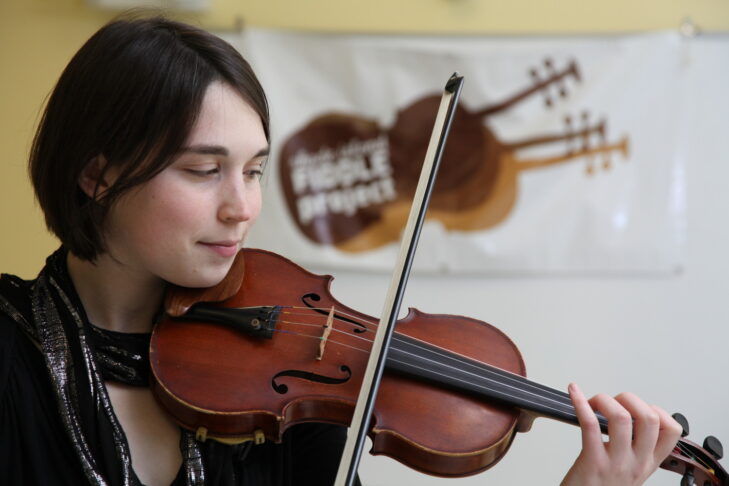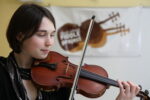On Tuesday, Sept. 15, JLive Music will present a conversation and demonstration with rising musician and composer Rachel Panitsch. To help set the mood for a meaningful High Holiday Tashlich experience (when it’s tradition to cast crumbs of bread on the water to cast away our shortcomings from the past), she’ll be sharing and discussing work inspired by the great outdoors she composed as a designated artist-in-residence for both Zion (Utah) and Acadia (Maine) National Parks.
In preparing for the JLive broadcast, we asked Rachel to share some of her thoughts on music, the great outdoors and rituals.
What is a national park artist-in-residence?
Many of our national parks have an artist-in-residence program, and each one looks a little different. At Zion National Park, four artists are chosen each year to stay for a month each at a cabin in the heart of Zion Canyon at the foot of the Angel’s Landing trail. It’s an area packed with visitors during the day, and completely isolated at night.
In Acadia National Park, the artist residencies take place in multiple locations, and I had the opportunity to split mine between three very different spots: Isle au Haut, Schoodic Peninsula and one of the gate houses on the carriage roads on Mount Desert Island.
Do you have a favorite memory from your residency experiences?
In each park, performing pieces in progress for the local community was a really meaningful experience, especially hearing back from residents about the surprising moments that resonated with them based on their own experiences in the parks.
With your deep interest in the outdoors, what does Tashlich mean to you?
The idea that each of us has internal work to do—and that we recognize it communally, and with such a physical motion, outdoors—is something I find really powerful.
- At Tashlich gatherings, I also remember first becoming aware of the idea of what a “larger Jewish community” could mean. We spent different years at different synagogues, shuls and temples in the Albany area. Then at this ritual, outside of their usual environments, I saw that rabbis from one place were friends with rabbis from another and that we were all going to be throwing pieces of bread into the same body of water with the same ducks. It was distinct from other times of year that way.
Is playing music outdoors a spiritual experience?
Singing or playing music outdoors can feel spiritual to me—maybe because it’s a vulnerable thing to do. And in feeling small, but singing anyway, that feeling of awe tends to show up. There are a few Jewish summer camps that I can still transport myself to in my mind because of how they created a special “clearing in the woods” for music and singing.
How does the music you’ll be performing relate to the ritual?
I’ll be performing short pieces inspired by specific trails and locations in these national parks. Each one will be an invitation to reflect on meaningful moments we’ve had in the natural world, as well as moments we are moving on from in the past year and where we’re heading. I hope the music will be a jumping-off point for being transported to or imagining a meaningful outdoor space.
Whether you’re preparing for the Days of Awe, love the outdoors or simply looking for some great music, tune in to JLive Music with Rachel Panitsch on Tuesday, Sept. 15 at 7 p.m. Register here.
Never miss the best stories and events! Get JewishBoston This Week.
This post has been contributed by a third party. The opinions, facts and any media content are presented solely by the author, and JewishBoston assumes no responsibility for them. Want to add your voice to the conversation? Publish your own post here.
MORE



